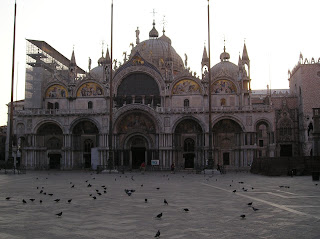It may be that the very thing that we attempt so hard to achieve may be the one thing that causes religion (Christianity) to go stale.
Evangelicals in the United States believe that society is losing its moral moorings, that the family is under attack, and that the traditional consensus on (read American) religious values is being lost or at the least sublimated by competing forces (e.g., pluralism, secularism) in culture. The spiritual environment in Europe is often painted as the next step for the United States in the journey away from faith in God and the loss of religious values in society.
Most of this picture is now being called into question by practitioners of sociology of religion. The traditional view is, sociologists of religion say, that the relationship between religion and American society resulted in a postwar America as settled in a period of industrialism. The widespread assumption was that the social order was underpinned by religious values, which not only preserved the status quo, but promoted the well-being of all.
This view of religion and America was derived from the normative functionalism of Talcott Parsons, who stressed above everything the integrative role of religion. His view was that religion was a functional prerequisite central to the models of social systems and social action that Parson's elaborated. American society was shaped by the focus on what people believed in the various churches, and that religion's role was in the integration of society and in promoting or discouraging social change.
However, sociologists such as Rodney Stark, Roger Finke and others are discovering a different picture.
“The natural state of a religious economy is pluralism,” Stark said. “Typically, pluralism has been repressed in favor of religious monopolies.”
For example, Stark contends in his book Cities of God that contrary to popular belief, Christianity flourished in cities in the Roman Empire that had a sizable plurality of religions. The rural setting proved to be resistant to the new religion long after the urban areas of the empire had become predominantly Christian.
Stark maintains that the same is true of the United States. The colonial era was a time of low religious fervor. This did not change until the colonies became more tolerant of religious traditions. Eventually the U.S. Constitution opened up the religious marketplace, making it easier for new religious groups to flourish. This religious freedom impacted the rising fortunes of such groups as Baptists, Methodists, and Catholics, but also saw the rise of such religions as Mormonism and Jehovah's witnesses. It was also the time when evangelism and the missions movement grew in importance.
The reason for this, says Stark and others, is that the religious mind is rational, and religion is the behavior of rational, well-informed actors who choose to 'consume' various commodities. Thus the choice of religious affiliation is made in a rational way, with the potential member weighing costs and benefits of each possible choice before choosing the one that maximizes rewards, although not necessarily that it minimizes costs. This model is referred to as an religious economies view (see Stark's The Rise of Christianity, p193-195).
A religious economy consists of all the religious activity going on in any society, and consists of a market of current and potential customers, a set of religious firms seeking to serve that market, as well as a line of products to serve those customers.
An open religious economy is a religious pluralism that forces each religious body to appeal successfully to some segment of the religious market, or to slide into oblivion. When various religious bodies specialize, it becomes easier for religious "consumers" to find the best product for them.
In other words, it seems that God likes competition. He has never necessarily been the guarantor of the status quo; after all he is especially concerned about the welfare of the widow, orphan, and alien in the land.
A another point that Stark and others make is about the modern view of secularization. The traditional view is that modernity was caused a decline in religious behavior and belief, caused by an increased emphasis on science and rationality that leads people away from supernatural explanations. Proponents of this view point to the low rates of religious adherence in northern Europe as evidence of the process of secularization.
However, Stark and other proponents of the religious economies perspective disagree. They believe that the religious condition of northern Europe is largely a supply-side problem rather than a lack of demand. That is, lack of religious participation in much of Europe reflects highly regulated [religious] economies dominated by state supported churches, and that these are inefficient firms who do nothing to create demand.
To put it another way, the choice is either a state supported church that offers little to the people, or, a general lack of belief and apathy toward religion.
What does this mean to us? Basically, people here in Europe have no real alternatives or choices. Christianity gained ascendancy in the Roman world because it could offer answers and alternatives to the questions of life that people faced day to day. Zeus, Thor, and Isis couldn't help, but Yahweh could. It is almost a remake of the conflict between Ba'al and Yahweh on Mt. Carmel (1 Kings 18). God seems to like competition.
It would seem, then, that our task is not to make Christianity the ascendant religion or the guarantor of the status quo. Instead, we should proclaim to others that Christ offers some real alternatives to the life they live now, to the questions that they face, and the hope that they need.



















